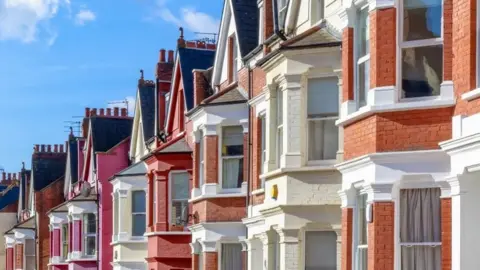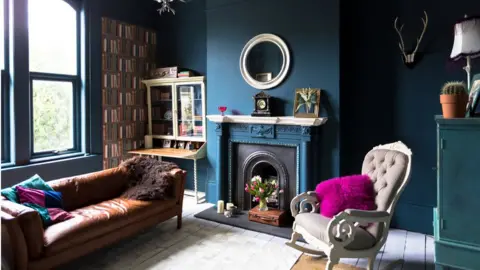Push for alternative to leasehold system
 Getty Creative
Getty CreativeExpansion of the commonhold system of home ownership as an alternative to leasehold tenancies has been urged by the government's law reform adviser.
Commonhold - where people own their homes without an expiring lease - was introduced 14 years ago, but has been little-used.
Meanwhile, there have been widespread complaints about the leasehold system.
The Law Commission wants commonhold to be more widely available in England and Wales and is consulting on reforms.
Under a leasehold, the person has the right to use the property, but they still have to get their landlord's permission for any work or changes to their home.
Leaseholders typically complain about being over-charged by managing agents for repairs to common areas, such as roofs, or about punitive ground rents.
It can also be expensive to extend a lease, and in some cases leases have been sold on at inflated prices.
Four million people in England own leasehold properties.
The Law Commission says commonhold gives ownership and control of the block to flat owners, as it is managed by a company made up of the owners. Properties are owned forever under the system.
However, since the Commonhold Act came into force in 2004, only 20 commonhold developments have been created - including just one in London, and one in Manchester.
The Law Commission says low take-up has been attributed to a range of reasons, including shortcomings in the law governing commonhold; mortgage lenders' unwillingness to lend on such properties; a lack of awareness of the system; and existing financial incentives for developers to use leasehold.
It has launched a consultation on the issue, to help develop recommendations for the government.

What is Commonhold?
 Getty Images
Getty Images- Commonhold allows residents to own their flats or houses outright, similar to freehold
- Commonholders have no landlord
- There are no leases to expire
- Residents are members of the management company, allowing them to vote on matters to do with upkeep
- Properties can be sold on as commonhold, unless 80% of owners agree to go to leasehold

The Law Commission said reforms would:
- Allow a commonhold development to include both residential units, as well as commercial units such as restaurants and shops
- Make it easier to convert from leasehold to commonhold
- Increase lender confidence in commonhold and so increase the choice of mortgage lenders available
- Replace service charges set by a landlord with commonhold contributions which have to be approved by a majority of those paying them
Professor Nick Hopkins, from the Law Commission, said commonhold provided a "once in a generation opportunity to rethink how we own property".
"It involves a culture change, moving away from an 'us and them' mindset," he said.
The government has already promised to ban compulsory leasehold agreements on new-build properties.
The Ministry of Housing, Communities and Local Government said: "The government supports the use of commonhold and is committed to exploring the benefits of all types of tenure to offer greater choice for homeowners.
"We welcome the work that the Law Commission is undertaking on commonhold and want to hear views from as many people as possible."

What is a leasehold?
- Someone who owns a property outright, including the land it is built on, is a freeholder.
- Most houses are freehold but some might be leasehold - usually through shared-ownership schemes.
- With a leasehold, the person owns a lease which gives them the right to use the property.
- But they still have to get their landlord's permission for any work or changes to their homes.
- Leaseholders have to pay their freeholders ground rent plus other fees in order to make changes to their homes.
- Non-payment of fees means a landlord can seek to forfeit the lease at any point.
- When the lease ends, the property returns to the freeholder unless the person can extend the lease.
- Some leaseholders wish to buy their freeholds to save themselves these costs.
Source: The Money Advice Service/Leasehold Knowledge Partnership
